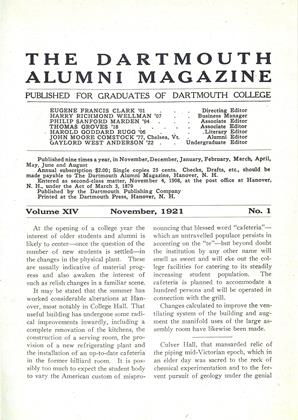Editor ALUMNI MAGAZINE:
May I offer a suggestion bearing upon the plan of raising the necessary amount each year towards the Alumni Fund on the Tucker Foundation? It is conceded that Dartmouth must have a large fund upon which to draw, the income of which shall be used to make up any deficit in the running expenses of the College, or Dartmouth must rely upon the. loyalty Of her graduates to make up this deficit by yearly contributions, or some other plan devised.
If the Alumni would respond promptly and cheerfully as called upon, would contribute readily as they are able, the yearly deficit would be met easily. And the added advantage of keeping the Alumni in close touch with the College would result through this method of meeting the inevitable deficit.
The difficulty as it looms large in the eyes of the Class Agents—in at least one of the agents—is the difficulty of generating enthusiasm and loyalty each year enough to secure from the class the quota laid down. A. few will respond to the appeal promptly; others will respond after three or four proddings; while others will make no response whatever.
The reasons why the Alumni are reluctant to contribute towards the College deficit are various—hard times; living expenses eat up all income; taxes now take all the surplus; other institutions in the South and West have greater need of money than does Dartmouth; the salaries of the Faculty going up while all other incomes are going down; long absence from Hanover has put men out of touch with the College. The real reason, however, is a lack of interest and a loss of personal responsibility on the part of the graduate.
I wish to make a suggestion, not a new one, as I know the plan has been tried and for some reason dropped—life insurance at the time of graduation for the benefit of the College. If properly presented, nearly every graduate would take out a modest policy, say $500, payable to the College at death or after a certain period, say twenty years. I know that the class of 1914 did this, and I think that several other classes about that time did the same. I recognize the fact that some men allowed their policies to lapse and that for one reason or another it seemed best to drop the plan that began several years ago.
I wish to ask this question of those who dropped the pljan. Was a careful record made of those students who took out insurance and was communication kept with them so that the status of the policies was known from year to year? I doubt it.
I feel sure that if an insurance proposition had been made to my classmates at the time of graduation that nearly every man would have responded favorably. If then the succeeding classes had done the same and a careful check-up system in the College Auditors' office had prevailed, Dartmouth would now be on easy street. This is a business proposition, as it seems to me. Enter upon the project in a business-like way; keep an accurate record of every man who takes out a policy in the interest of the College; record the renewals, yearly payments, cancellations, etc., and encourage every man to keep his insurance policy alive. In a few years there would be little need for any of these yearly drives that trouble so many of the Alumni and drive class agents crazy.
 View Full Issue
View Full Issue
More From This Issue
-
 Article
ArticleTHE UNDERGRADUATE'S RELATIONSHIP TO THE COLLEGE
November 1921 By ERNEST MARTIN HOPKINS -
 Article
ArticleAt the opening of a college year the
November 1921 -
 Sports
SportsFOOTBALL
November 1921 -
 Article
ArticleTWO DISTINGUISHED VERMONT ALUMNI
November 1921 By JAMES FAIRBANKS COLBY '72 -
 Article
ArticleMEMORIAL FIELD FAST BECOMING A REALITY
November 1921 -
 Class Notes
Class NotesCLASS OF 1905
November 1921 By Fletcher Hale








